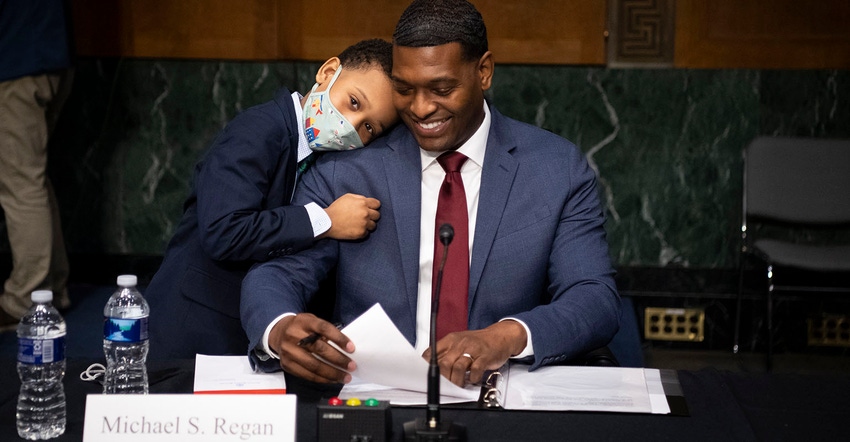
While sitting before the Senate Environment and Public Works Committee Wednesday afternoon, Environmental Protection Agency Administrator nominee Michael Regan again confirmed he would work together with stakeholders to try to strike the right regulatory balance for those in agriculture.
He says his experience starting as a career staffer at EPA and most recently as secretary of the North Carolina Department of Environmental Quality offers a track record of convening stakeholders and fostering an open dialogue with a commitment to build consensus.
“We can’t regulate our way out of every problem we approach,” Regan says, adding he was able to do that by tackling several controversial issues including the adverse impacts of hog farms in his home state of North Carolina.
Sen. Richard Burr, R-N.C., introduced Regan as one who has found the right balance by reaching out to stakeholders and building a partnership with rural communities that is constructive and not adversarial. In introducing Regan, Burr and others recognized the over 20 agricultural groups supported his nomination.
Related: Ag groups supportive of EPA nominee
Sen. Thom Tillis, R-N.C., adds Regan has a reputation of “someone who listens, takes in input from both sides and comes up with a fair outcome.”
WOTUS action
Several senators asked Regan how he would approach the rule defining waters of the U.S. – WOTUS – written under the Obama administration and the Navigable Waters Protection Rule now on hold released by the Trump administration. Regan says, if confirmed, he would take a look at what EPA’s options are to address any kind of lingering concerns whether that be litigious or concerns with stakeholders and bring all to the table to understand those concerns.
“We do need to move forward to provide certainty to our farming community, especially our small farmers, so decisions can be made and investments are not stranded on our sidelines,” Regan says. “But I also want to be sure we do that in a way where we are protecting our water quality, our wetlands and our bays.”
Related: Biden administration: Will farmers see another WOTUS redo?
Expressing the uncertainty he faced at the state level from federal jurisdiction, he recognized there is a role states can play in protecting water quality and understanding the unique agricultural needs of water makeup in different regions.
“I want a rule that moves forward that’s not overly burdensome but gives states the flexibility to protect water quality and protect the local agricultural economy,” Regan says.
He says he believes farmers aren’t looking for shortcuts, but many didn’t understand previous definitions laid out in WOTUS. He also believes farmers need more resources and technical assistance.
RFS transparency
Members from both sides of the issue talked about the need to improve the EPA’s handling of the Renewable Fuel Standard and the small refinery exemption waivers. Oil-region senators called for more exemptions, while Midwest senators asked for EPA to prioritize execution of Congress’ intent for the biofuels mandate.
“You have my commitment to take a look at the RFS program and introduce some transparency into that, let science lead us and follow the letter of the law,” Regan says in questioning from Rep. Tammy Duckworth, D-Ill.
He adds that President Joe Biden has “not been shy that agriculture will have a seat at the table as we tackle climate change” and specifically focused on biofuels and advanced biofuels. Regan says he’s already discussed efforts with Secretary of Agriculture designee Tom Vilsack to partner together on how biofuels can play a role in climate efforts.
In a line of questioning from Sen. Joni Ernst, R-Iowa, she notes that a number of items will be waiting at his desk involving the RFS including pending SRE decisions, renewable volume obligations for 2021 and 2022, pending cellulosic biofuel petitions, requests by governors to waive the RFS due to COVID and also the long-term plan for the RFS beyond 2022.
“The RFS definitely is a priority for this administration,” Regan says. “We plan to do a thorough review of all of the decisions that fit under the RFS,” he says, and plans to include stakeholders and Congressional members in that evaluation.
Who’s in charge
Another point of discussion during the hearing was the authority Regan would hold as the EPA administrator compared to previous EPA Administrator Gina McCarthy who will serve as a national climate adviser and former Secretary of State John Kerry as international climate envoy.
Related: What does Biden’s climate team mean for farmers?
Both McCarthy and Kerry do not require Senate confirmation and EPW Committee Chairwoman (soon to be ranking member) Sen. Shelley Moore Capito, R-S.V., expressed concerns about their sweeping authority and ability to impact every single piece of the federal budget.
When asked who Regan would answer to – the presidential advisers of McCarthy and Kerry – Regan responded President Biden is in charge. He adds if confirmed he recognizes Congress bestowed certain powers and authority to him within EPA’s jurisdiction and he would be “leading and making those decisions and accepting accountability for those decisions.”
Read more about:
Michael ReganAbout the Author(s)
You May Also Like






